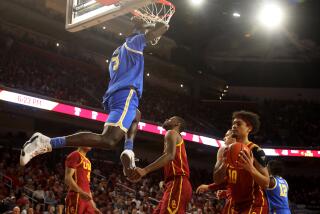This Is a Job for . . . Ueberroth?
- Share via
One of my first interviews with Peter Ueberroth, in the days when he was Olympics czar, began with 15 minutes of bickering over whether I could tape-record the conversation. This was, I would learn, vintage Ueberroth. He didn’t give a hoot about being taped. He simply wanted to set me back on my heels, to make clear from the outset who was running the show.
Well, Ueberroth hasn’t lost his knack for combative gesture. Last Thursday, he stood beside Pete Wilson at a Los Angeles press conference. He listened politely as the governor was asked what could be done about businesses fleeing to Idaho. He waited while Wilson began a weak-kneed response about how California “can’t win them all.” And then he pounced.
“Let me interrupt,” Ueberroth broke in. “Because this is about competing. The question is: Are we strong enough to compete? And the answer to that guy (going to Idaho) is ‘Los Angeles.’ . . . In every way, we win that battle. We have transportation to the marketplace much quicker. We have a better market to function in. There are a thousand reasons. A better work force. He can expand here. A thousand reasons. We win.”
As Ueberroth hurtled toward a conclusion that the governor and his aides needed to “get off their backsides,” Wilson fiddled with his microphone and tried not to look too peeved. It was delightful, though hardly subtle, theater. And it left little doubt about who--on this day anyway--was running the show.
Wilson asked for it. Last December, when he picked Ueberroth to run the Council on California Competitiveness, the governor had just embarked on a curious strategy of bad-mouthing California. By embracing the myth that California companies were poised to defect, Wilson sought to advance the old GOP agenda of tax breaks, softer environmental regulations and other profitable “reforms.” But he needed to buttress his position. Hence, the commission.
Ueberroth would not have been my first choice for lackey. He calls his consulting business “the Contrarian Group” for a reason. To this day, he revels in reminding audiences how he defied the conventional wisdom that the L.A. Games would be a disaster. Ueberroth thrives on cutting against the grain, on maintaining a maverick image.
From the start, he put distance between the commission and the governor. For example, he wouldn’t let references to “Wilson’s Commission” pass uncorrected, always noting: “It’s the California Commission.” When the report was finished, Ueberroth wouldn’t give Wilson a copy until just before the first press conference. This put the governor in the ridiculous position of conceding that, while he supported the report wholeheartedly, he hadn’t yet read it.
I doubt Wilson liked the report as much after he did read it. While it offers plenty of gloom and doom, some of the suggested remedies reflect the agenda now advanced by Sacramento Democrats rather than by Republicans. Also, the report blames the governor--along with the Legislature, business leaders and lobbyists--for letting California blunder toward an economic cliff.
Ueberroth himself seems a bit apologetic about the report. He described the 107-page document to me in dismissive tones as “bare bones,” the product of “too many editors.” Instead, he preferred to place emphasis on the message he brought with the report: that the jobs exodus is only “a little factor, maybe 10%,” of a larger, more fundamental economic drift; that California nonetheless is a great place for business and can be greater still; that the state needs to streamline government, set a strategic course and then go out and compete.
“It’s time to get in the game,” he said. “It’s not whiny time.”
Now Ueberroth is savvy enough to grasp that none of this will happen in Sacramento under present management. As Howard Jarvis demonstrated, California’s leadership will dance your dance only when it can be shown the people are behind you. So far, from Wilson to Willie Brown, all Sacramento is pretending Ueberroth’s work didn’t happen. He needs a mandate.
Already, Ueberroth intends to make the report an issue in every legislative race. But it might take more. It might take a candidate for governor to run in 1994 with the report and its overarching message of reform. Not just any candidate would do. It would require someone, say, with star quality, an executive track record, capable of running as a credible outsider and perhaps even as an independent--a California version of Ross Perot.
Anyone come to mind? . . . Yes, in his search for California’s vanishing jobs, Peter Ueberroth maybe, just maybe, has found one for himself.
More to Read
Go beyond the scoreboard
Get the latest on L.A.'s teams in the daily Sports Report newsletter.
You may occasionally receive promotional content from the Los Angeles Times.







